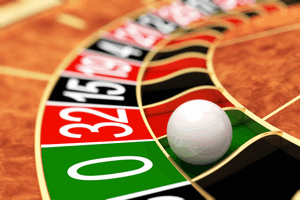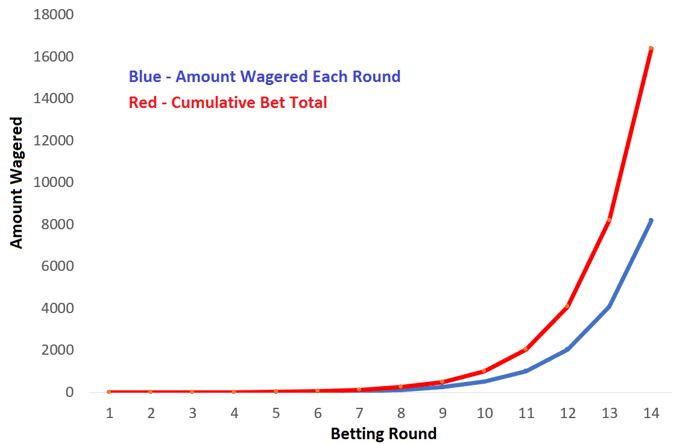 Betting systems rely on mathematical probabilities to ensure you do not lose. The problem is this isn’t quite true, the laws of maths and physics means data doesn’t often fit into a nice tidy bell curve and a series of bad results can commonly occur.
Betting systems rely on mathematical probabilities to ensure you do not lose. The problem is this isn’t quite true, the laws of maths and physics means data doesn’t often fit into a nice tidy bell curve and a series of bad results can commonly occur.
Should you have an unlimited pot of money to bet with then the theory is true, you will never lose using a betting system, but no one has an unlimited pot of money.
From progressive to regressive, Martingale to hedging and arbitrage, this guide tells you all you need to know about sports betting systems, what they are, where they came from and the theories behind how they work. We also discuss whether any actually work, if they are legal and if you can be banned for using them.
Here we discuss betting systems rather than system and permutation bets, such as Lucky 15, etc. Details of these can be found in our bet types section,
- Betting Systems:
- Do they work?
- Can you be banned?
- Sports Systems
- Casino Systems
- Martingale
List of Betting Systems
| Betting System | Other Names | Positive / Negative Progression |
|---|---|---|
| Arbitrage | Arbing | N/A |
| Handicapping | Normalising | N/A |
| Hedging | Mitigation | N/A |
| Martingale | Double em’ Up | Negative |
| Mini-Martingale | – | Negative |
| Grand Martingale | – | Negative |
| Anti-Martingale | Reverse Martingale | Positive |
| Labouchere | Split-Martingale / Cancellation | Negative |
| Reverse Labouchere | Reverse Cancellation | Positive |
| D’Alembert | – | Negative |
| Contra D’Alembert | Reverse D’Alembert | Positive |
| Ascot | – | Positive |
| Fibonacci | – | Negative |
| Paroli | Parlay | Positive |
| 1 3 2 6 System | – | Positive |
| Oscar’s Grind | – | Positive |
| Patrick’s System | – | Both |
| Card Counting | – | N/A |
Click the name in the list to skip to a description of that betting system
Do Betting Systems Work?
 We categorically do not support the use of betting systems as a way to win over the long term. Whilst some people may have won a lot of money using these systems, ultimately far more people have fallen on the wrong side of probability and lost. The short answer is no they don’t work, unless you cheat, which is illegal, and not very fun for other punters either.
We categorically do not support the use of betting systems as a way to win over the long term. Whilst some people may have won a lot of money using these systems, ultimately far more people have fallen on the wrong side of probability and lost. The short answer is no they don’t work, unless you cheat, which is illegal, and not very fun for other punters either.
Think of it this way, bookmakers and casinos are effectively glorified accountants and statisticians, just with flashy lights and tantalising features – everything they offer has a margin for profit. Operators spend a fortune on spotting system bettors, and trust me they are aware of every trick in the book. At best you will win in the short term but eventually you will either lose by the laws of probability or the operator will terminate your account.
You will find many punters telling you that betting systems work, either known systems or ones created by them. This means one of three things:
- They are cheating and therefore this is not a betting system it is cheating.
- They have been lucky and at some point they will lose if they keep playing.
- They are lying about their losses in order to sell you something.
Are Betting Systems the Same as Cheating?

No, a betting system merely exploits the statistical probability of a series of events happening.
In theory, and with an unrestricted bank roll, you can use these probabilities to win in a completely legal way. Even card counting is legal in principle as this relies on statistical factors. The grey area comes in if you use external devices or spotters to assist the player, in which case this contravenes the laws of the games.
There is a difference in what is classified as cheating under law (effectively fraud) and what is classified as cheating by a casino or bookmaker. If you use pure skill on your own, such as counting cards, to increase your chances of winning then many operators would call this cheating.
While they have every right to ask you to leave or stop your from playing, as these are private companies and premises and they can do what they want, this isn’t actually cheating. If on the other hand you use accomplices to say look at other peoples cards or tell you their own cards, then this is cheating.
Can you be Banned or Restricted for Using Them?
 While betting systems, such as card counting, are not illegal, they are not allowed by most bookmakers and casinos within their own rules, so they will object to the practice and try to prevent it. Operators at the end of the day are private businesses and will easily ban you, or severely restrict your account, should they think you are using certain systems.
While betting systems, such as card counting, are not illegal, they are not allowed by most bookmakers and casinos within their own rules, so they will object to the practice and try to prevent it. Operators at the end of the day are private businesses and will easily ban you, or severely restrict your account, should they think you are using certain systems.
Interestingly there are some historic cases where operators have been banned from excluding punters that use betting systems. In Atlantic City (state of New Jersey) a Supreme Court decision in 1979 set a precedent for the legal use of card counting. Ken Uston took a casino in the city to court claiming card counting is a skill and casinos did not have the right to ban players simply because they were skilled, he won the case.
The casinos were clever though and simply increased the number of counter measures they used against skilled players. These ranged from using high speed dealers to highly advanced computer systems to spot suspects.
UK online bookmakers have the right to terminate your account if they believe you are trying to use betting systems. There is not a lot that you can do in this instance but if you believe you have been unfairly discriminated under this pretence then you can make a complaint. See our article on how to make a complaint against a bookmaker.
Although an operator can suspend your account whenever they wish they cannot refuse to pay you out on a settled bet unless they can prove you directly contravened their terms. Even then if you can prove those terms are unduly harsh or unfair you may still even have a case.
What is Gamblers Fallacy?
 This is the common, and mistaken, belief that if an occurrence happens more often than probability dictates in the here and now then it will happen less often in the future. This is plainly wrong.
This is the common, and mistaken, belief that if an occurrence happens more often than probability dictates in the here and now then it will happen less often in the future. This is plainly wrong.
If you flip a coin and it lands heads up 5 times in row on the sixth flip the chances of getting a head is still even irrespective of the previous results. Effectively in a game or scenario where events are independent (not linked) then the previous outcome has no bearing on the next outcome.
Gamblers fallacy is a common reason why punters chase loses, it can also be a common sign of addiction in some cases. The best thing to do to avoid this happening is to set yourself a budget and target before you begin to gamble.
If you reach a certain amount of winnings or loses then quit, don’t continue to chase further winnings or win back lost stakes.
What is House Edge?
 This is the profit margin built into a game or event by the bookie or casino. In the next section we discuss systems used for even money betting. Roulette being the most common example. The problem is in the real world, when betting commercially, is there is no such thing as an even bet.
This is the profit margin built into a game or event by the bookie or casino. In the next section we discuss systems used for even money betting. Roulette being the most common example. The problem is in the real world, when betting commercially, is there is no such thing as an even bet.
The zero for example on the roulette wheel is neither black, red, odd or even meaning that betting on supposedly ‘even’ roulette bets can never be even. There is a 1/37 chance of neither result occurring. This is worse with American roulette that also has a double zero, this means there is a 2/38 chance in neither result occurring.
House edge, vigorish, margins, whatever you want to call it, is the ultimately reason why any fair betting system will fail. Over time you simply cannot beat probabilities and unless there is a mathematical loop-hole you can exploit (and there won’t be because these are multi-billion dollar games and businesses) then, over time, the house will always win.
Types of Sports Betting Systems

The systems described further down this article such as Martingale are best used when betting on even money.
These can happily be used for sports betting on even odds but in general are more suited to fixed odds games.
There are some betting systems more commonly used in sports betting that we will discuss here:
Arbitrage Betting
This basically exploits the fact that individual bookmakers set their own odds lines and therefore there is natural variation in the market. Colloquially this is known as arbing.
For example Liverpool are playing Manchester United. Two bookmakers are giving different odds on the draw no bet market, one bookie is giving 6/5 (2.20 in decimal) on Liverpool and the other 6/5 on Manchester United. If you bet £100 on both lines with the two bookies in this case you are guaranteed to win £20 if either team wins and if it’s a draw you will get your stake back as it is a ‘draw no bet’.
This system can be used in theory on any market where outcomes are offered differentially between bookmakers. Be very careful doing this. First of all if you are found to be doing it the bookie will ban you, the will also likely circulate your credentials and you will be banned from a series of operators. Secondly most of these arbitrage bets have small margins and this means you need to stake large amounts, suspicious in itself. Finally different terms and conditions between bookmakers can land you in hot water. What happens if one bookie voids the bet according to their terms but the other bookie doesn’t?
In the modern world of online betting this can make you short term rewards but you will be found out very quickly. Whereas the practice is not strictly illegal very few operators will tolerate it. Generally they will drop your bet limits so low that arbing becomes futile.
Handicapping
A handicap assigns an advantage or disadvantage to an outcome to equalise the chances of winning. In sports betting this is commonly used to normalise odds in instances where there is a strong favourite.
Handicap betting is a popular bet form in arbitrage betting. If, for example, one sportsbook is offering a 3 point advantage on team A at favourable odds in a Rugby match and another book is offering a 3 point advantage on team B at favourable odds in the same match. Backing both outcomes independently means you can actually win both of the bets if either team wins by 2 points or less. If one team wins by 3 points or more you will still win at least one bet.
Hedging
This is where we get the phrase hedging your bets. More commonly encountered in investment markets the principle is to offset potential loses or gains by making a second investment or bet.
This is a great betting option when done using live betting in play online. For example, you bet on Everton to beat Arsenal ‘draw no bet’ at odds of 2/1 with £100, potentially giving winnings of £200. Everton are winning 1-0 and now the odds on Arsenal beating Everton ‘draw no bet’ are also 2/1 so you can now hedge your bet and stake £100 on this line. Whatever the outcome you will stand to win £100.
Hedging is very common when using exchange betting, through operators such as Smarkets. Essentially both backing and laying at a favourable price will always ensure a profit. Beware of commission rates though that you will need to factor in.
Even Money Betting Systems

In general all even money betting systems fall into either a progressive or negative progression category.
We will discuss actual systems in the next section. Whatever the system these will at best help you win money in the short term but cannot be relied on to ensure endless winnings.
Positive Progressive Betting Systems
The basic concept here is to increase your stake when you win and these systems are very popular in casino games such as roulette.
Increasing your stake each time you win but decreasing when you lose is designed to minimise loses. As an example say you are playing roulette and betting on red with a starting stake of £10. Each time you win you add another £10 to your bet and each time you lose you reduce your bet by £10.
If you were to win 4 times in a row you would win £100, £10 first spin, £20 second, £30 third, £40 fourth, and so on. If you then lost your fifth spin in this case betting £50 then you would still be £50 up. Alternatively if you have a 4 spin losing streak your stake would always remain at £10 so you would only lose £40 in this case.
This can maximise your profit if you do have a winning streak but it doesn’t actually change the chances of winning or losing. The only good thing about this is it can keep your loses down during losing streaks.
Negative Progression Betting Systems
In essence this is the opposite of positive progression.
Here you increase your stakes when you lose, the theory being that you will win eventually and get all of your loses back. The problem is there is no limit on the number of times you can lose and is your bankroll strong enough to survive a long run losing streak using this system?
Lets say here you start with a stake of £10 also betting on black. Each time you lose you double your bet. If you lose 7 times in a row for example this would cost you £1270 (10+20+40+80+160+320+640), in order to wager an 8th spin you need to wager £1280, this would require a total bank roll of £2680. Now even if you win on the 8th spin you will only win £10.
You can win and make a profit form negative betting but eventually your luck will run out. If you had a £3000 bank roll then 8 loses would wipe you out using the above example. The probability of losing 8 times, if say the odds were exactly even, which they are not, would be 256/1. That might seem like a lot but a roulette table with a spin every 3 minutes would, on average, see this happening every 12.75 hours. Think of the number of roulette tables in the world (online and real world) and this tells you just how often this can happen. Place these bets at your own risk.
Martingale System
Possibly the most famous and well known betting system is the Martingale negative progression betting system. The system originated in France in the 18th century although there are reports that the name may have arisen from Henry Martingale, the owner of an English casino in the same era, reputedly promoted customers to ‘double up their wagers. He didn’t invent the system but he was possibly the first person to advertise it.
As described above the system relies on increasing your stake each time you lose. The easiest and most common application of the system is for situations where the odds are even, or as close to even as possible. Red/black betting in roulette is a common usage of this system, here the odds are actually 48.6% with one zero (UK version) and 47.4% with double zero (US version).

The Martingale system would be unbeatable if your bankroll was unlimited but this is never the case. As wagers constantly double the stake can very quickly become dizzyingly high after a series of loses. Even starting with a bet of £1 after 11 losing bets you will need to wager a gigantic £2048 just to win your £1 back (1 2 4 8 16 32 64 128 256 512 1,024 2,048). If you then lost the 12th bet your cumulative loses would be £4,095.
Although the risk of losing 12 bets in a row is low (2048/1) it will happen eventually trust me. The other issue is even if your bankroll was gigantic by the time you get to this point the casino, bookmaker, machine or online game will probably kick you off anyway. This is either because they spot the system or because they want to promote responsible gambling and may think you have a problem.
Mini-Martingale
The mini-Martingale is a Martingale where you limit the number of times you are prepared to double up. This may reduce the number of huge stakes you get into but it will also increase the number of losing streaks you have and therefore the amount of loses.
This would only ever work if you have a massive winning streak, which is completely based on luck anyway.
Grand Martingale
The grand Martingale is a version of the Martingale is designed to increase your winnings when you do win. The problem with a Martingale is you will only ever win your initial unit stake even if you started with £1 and had 11 loses in a row wagering £2048 on your 12th bet. The Grand Martingale system therefore adds an additional unit to your stake following each loss.
This way when you do win you will win more than the base stake. This however does not avoid the basic problem and you will still lose eventually.
Anti-Martingale
The anti-Martingale is sometimes known as the reverse Martingale. Here you double up each time you win and so this now becomes a positive progression betting system. This is, in theory, a safer way to bet than the original Martingale but ultimately you will still need a winning streak in order to win and all it takes is one loss and you are back to square one.
Labouchere / Split-Martingale
The Labouchere betting system, also known as the split-Martingale or cancellation system, allows players to work through a series of numbers that will eventually equal a profit when even money betting. Popular with roulette red/black, even/odd betting.
The player starts by picking a list of numbers that define the amount the player would like to win. The punter then works through the list by crossing off numbers as they happen. For example a basic series of numbers, 1, 2, 3 and 4, means the bettor expects a profit of 1+2-3+4=10. The systems starts by wagering the top and bottom number on the list added together, so in this case 1+4=5. If the wager wins the punter now crosses off the top and bottom numbers and now stakes the sum of the new top and bottom number, 2+3=5, if they win again then all numbers have been crossed off and the player has won 5+5=10, the original amount of money the bettor wanted to win.
In the player loses their first bet in this example the amount that is lost is now added to the list. Here the list would become 1, 2, 3, 4, 5. The next wager would therefore be 1+5=6. If the bet lost again then 6 would be added to the list, the next wager would therefore be 1+6=7, and so on.
The system originates again in the 1800’s from avid roulette player and English aristocrat, Henry Labouchere. This system is just as vulnerable as any other, it requires a large bankroll and high stakes limits to work effectively.
Reverse Labouchere
The reverse Labouchere is simply a positive progression version of the above system. In this case you only add a number to the list if you win. You continue to bet the sum of the first and last number in the system however now when you lose you actually cross off the top and bottom number in the list.
This system relies on absorbing many small loses in the hope that your wins outnumber your losses. When do you stop your progression is the big question? This may work in the short term but again you will lose long term.
D’Alembert System
This system was invented by an actual French mathematician, Jean-Baptiste le Rond d’Alembert. The system is based on assuming an equilibrium as both winning and losing bets should eventually equal each other.
The basic concept is to add a chip after a losing bet and remove a chip following a winning bet. This now means winning wagers will always be more than losing wagers. This is not immune to the usual problems however of either running out of bankroll or hitting the house limits.
The mini-D’Alembert restricts the number of bets in a series but is not more successful than the mini-Martingale. This system can be more successful of done in partnership with opposite bets.
Contra D’Alembert System
Again just the reverse of the D’Alembert. Here you remove a chip each time you lose and add a chip each time you win. This can help protect your bankroll better as when you have a long series losing streak you are at least reducing your stake each time. Ultimately this is no more successful than its counterpart.
Ascot System
Another even money betting system that relies on a list of numbers usually from 7 to 11 long. A standard series would be 2, 3, 5, 8, 13, 20 and 30, in this case the players first stake is the middle number, 8.
If the bet wins then the next wager is the next highest number in the list, 13. If this were to win the next wager would be 20, and then 30. At this point the series is finished and you stop betting. Conversely if you lose your first bet you move down the list to 5, then 3 and finally 2. In a losing series 2 becomes the last bet and you then stop.
The Ascot system is good in the sense it can stop you losing silly money but in the long run you will still always lose.
Fibonacci System
Leonardo Bonacci was an Italian mathematician in the 13th Century, known by the name Fibonacci. He introduced age old Hindu-Arabic numbering system to Europe in his famous book Liber Abaci in 1202 in which he proposed the Fibonacci sequence or Fibonacci number.
The sequence dictates that the next number is always the sum of the previous two numbers. Up to 13 places the sequence is 1, 1, 2, 3, 5, 8, 13, 21, 34, 55, 89, 144, 233, 377. The Fibonacci sequence is naturally observable in many biological systems from how embryos develop to the structure of flowers in plants.
In betting the number series equates to the value of the stake. Each time you win you drop your stake back to the previous level. This is relatively low risk compared to other systems and works well when betting in partnership on roulette or craps for example. This system is commonly used by traders in stock markets too.
Paroli or Parlay System
This system is a positive progression that is effectively the opposite to a Martingale but with limits for maximum stake. First pick a stating stake between 20-50 times your bankroll, lets say £10. For the first bet wager one unit stake (£10) and if you lose keep the stake the same (£10), if you win double your stake to £20. Each time you lose you reduce your stake by one and if you win you double your stake. The limit comes in if you win three in a row you stop increasing the stake and you drop back down your original £10.
The paroli or parlay system allows you to exploit short winning streaks that happen more commonly, hopefully without losing too much. Ideally you will double up three times, take the winnings and then start again.
1 3 2 6 System
Similar to a Parlay this system also involves increasing stakes after a win. First set your betting unit and the amount you would like to win (usually between 20-50 times your stake). You stake a single unit as your first stake (say £10) and then move through the 1, 3, 2, 6 system with successive wins. Each time you lose or win four bets in a row the series starts over again at the beginning.
Using this system there are only four possible outcomes. Lose the first bet = lose 1 unit, win first lose second = lose 2 units, win two lose third = win 2 units, win three lose the fourth = even and finally win all four = win 12 units.
Oscar’s Grind
This is possibly the lowest risk, and lowest reward betting system (hence the grind). The simple principle is to increase your stake by one unit after each win and do not alter the size of a bet following a loss.
The point is whether it is a win or a loss you will never lose or gain more than one unit in one betting series. For example your unit stake is £2. You lose 3 in a row, you’ve lost £6. With your fourth bet you win, you are down a net £4 so you add a single unit (£2) to your next bet, you win, and now you have broken even. For your 6th bet you now revert back to a single unit stake (£2) and so on.
Patrick’s System
This is a more modern gambling system named after a professional gambler, John Patrick, and outlined in his own book. The system utilises both positive and negative progression. Here you begin with a stake that is at least twice the table minimum. Each time you win you reduce the stake to half the size of the winning wager. For example if you bet £20 and win your next wager will be £10. If you win again this time you return back to your first unit stake of £20 and then increase your unit stake to the same amount as the table minimum each time.
If you were to say have 6 wins in a row with a £10 table minimum it would look like – 20, 10, 20, 30, 40 and 50 giving £170 in winnings. The system suggests quitting after 4 loses in a series but like most systems this is just as vulnerable to random chance as any other, and will you be able to stop after 4 loses?
Card Counting
 Card counting gets a special mention in this article. This is something that can actually work and make you a profit. It is however not so much a betting system as such but a specialised skill.
Card counting gets a special mention in this article. This is something that can actually work and make you a profit. It is however not so much a betting system as such but a specialised skill.
There are many forms of card counting and many similar systems used in all sorts of games other than card games. The principle relies on predicting statistical probabilities in games where outcomes are linked. In card games for example there are a given number of cards in a deck, this means that you can calculate, in real time, the probability of the next card value based on the value of the cards already shown. If you can so this successfully you can overcome the house edge and turn the odds in your favour.
There is nothing illegal about doing this ,unless you use equipment or partners to help you. In practice you are unlikely to get away with this over long periods of time as operators have invested literally billions to prevent it. You will also need a very mathematical brain and a lot of practice as well as self-discipline to perfect the art.
Card Counting Detection Technology
By monitoring betting activity contstantly casinos and gambling operators can easily spot card counting. They can do this physically using pit bosses or through the ‘eye in the sky’ video surveillance. Surveillance is so good automatic facial recognition software can even identify you as you walk in the door before you even sit down at a table.
There are some common markers that operators look out for, these include: large bets and buy ins, large swings in stake amounts, playing a very small number of hands, moving between tables and playing multiple hands.
Card Counting Countermeasures
As it is not strictly illegal to card count and therefore casinos use a number of countermeasures to reduce it.
This can include harassing the player, talking to them a lot to throw them off and break the concentration required.
Increasing deck shuffling, bringing in dealers that deal quicker, facial recognition, software that counts and tracks bets, etc.